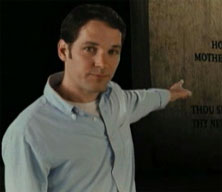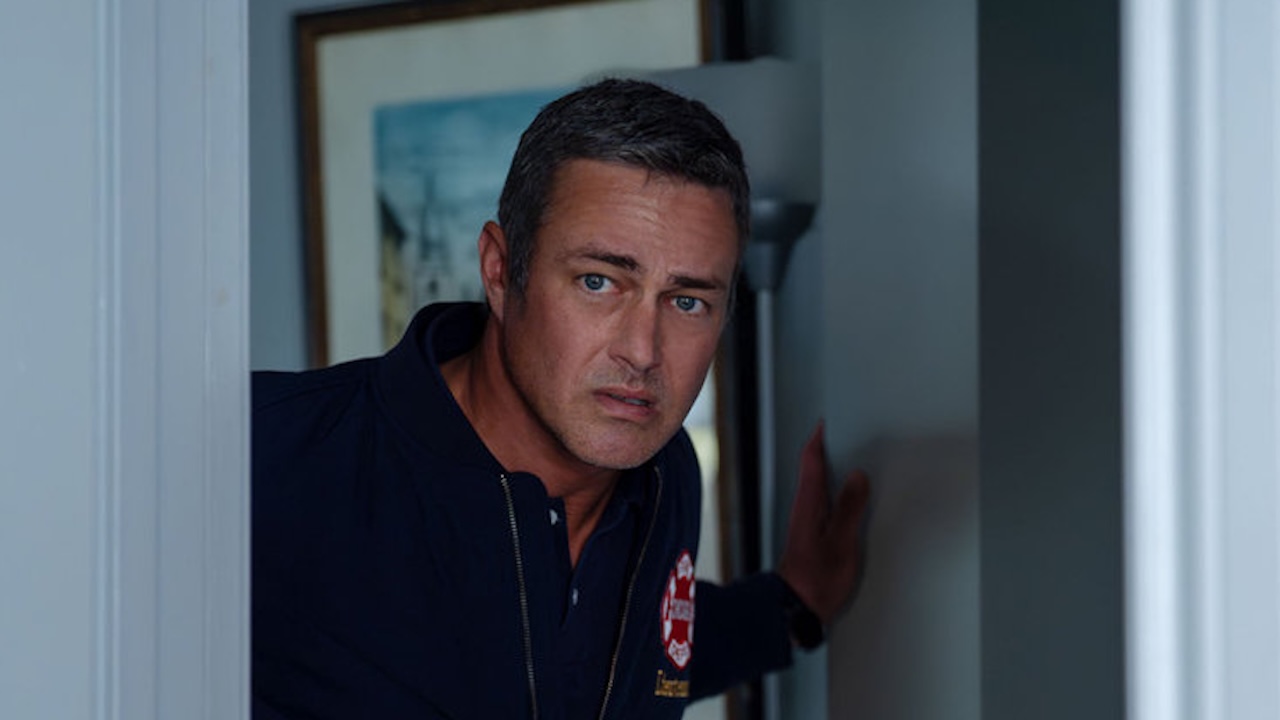Interview: Paul Rudd

In The Ten, a movie made up of ten different shorts, who better to hold it together than Paul Rudd? A familiar face to most moviegoers, including fans of Wain’s previous work (Rudd was the jerky counselor Andy in Wet Hot American Summer), Rudd narrates the film as a speaker in a black void featuring nothing but two enormous stone tablets, engraved with the Ten Commadments. As he tries to do his job, though, he is distracted by his affair with Liz (Jessica Alba), and his subsequent separation from his wife Gretchen (Famke Janssen). On top of acting as a narrator, Rudd also produced the film—but it wasn’t always supposed to be that way. In fact, filmgoers just barely missed their opportunity to see a Paul Rudd nude scene….
So what’s it feel like to be the linchpin of this movie? You and God held the Ten Commandments together.
Rudd: Just for the record, it’s nice to hear my name mentioned with His in any sense. Normally, growing up with my father it was “Paul... god dammit! Stop it, get away from there!” You know, it’s a responsibility. The trick in making this movie was how do you make it a movie and not an episode of ‘Saturday Night Live.’ There has to be some cohesion to it so it seems like you’re actually making a movie. Besides the fact that there are characters whose storylines bleed into one another, one of the later additions was the role of a narrator. It was one that I was never going to play, but Jessica Alba-- we’re still trying to figure how how she even said yes to be in this-- but she said yes, and she had a one-day window to shoot before she was off to do Fantastic Four or whatever it was she was shooting. It was actually a month before we were supposed to start principal photography on the movie. It came up very quickly, and as a result, I wound up playing the narrator, because that part wasn’t cast and her scenes were with the narrator. This is the thing that also makes me feel skeevy. You see this, I’m also a producer on the movie, and I’m in it the most, and kissing Jessica Alba and Famke Janssen. I’m very self-conscious about that-- I know I shouldn’t be, but I know the perception is like “Oh, God, you’re gross, man.” And I don’t blame people for thinking that. I like to think of it as I saved the movie.
On the other hand, the other producers got written into the naked scene.
Rudd: By the way, that was what I was supposed to be in. I was going to be Miles.
How did you work it out, not to have to get naked?
Rudd: I was asked not to get naked. It was like, “We need to shoot with Jessica in two days, we need somebody to play Jeff.” Because I was one of the producers, David asked me if I could play this part. I said, ‘Literally, whatever we need to do to help the movie not fall apart or get made,” and it just so happened that it was the narrator that I wound up playing. But it does seem really self-important.
Your Daily Blend of Entertainment News
Do any of the Ten Commandments strike you as really wacky or absurd in general?
Rudd: I don’t think they wanted to have any comment on the Ten Commandments. I think it was originally ‘Let’s make a movie that every member of ‘The State’ can do.” I honestly think this was the genesis-- pardon the pun. Everyone in ‘The State’ could film something, it wasn’t going to be a big time commitment. The Ten Commandments was a good template to use to have it all make sense. There was nothing that’s really said about the Ten Commandments. At the end when we’re all singing “It’s all about love,” it’s completely unearned. There’s nothing in the film that says “This is what it’s really all about,” and it’s intentional, and ludicrous. I think it’s just the Ten Commandments because it seems funnier than the Bill of Rights.
You’re in this movie where people are playing all these out-there characters, but you’re kind of this straight man. Was that a disappointment for you, or different for you?
Rudd: Not at all. I thought the script was very funny, I wanted the movie to be funny, I was happy in whatever way to be a part of it. It was in a way kind of tricky-- I don’t want to say it was really difficult, because the whole thing is absolutely stupid. It’s not like I’m playing Christy Brown in ‘My Left Foot.’ With the narrator there wasn’t a story you could hang everything on. The whole adultery storyline came about later on. As they were rewriting some things, they realized this one might be unfilmable, and why not bring the narrator into the real world. The narrator storyline was the last thing that was really worked on. I was happy to be in it, basically.
You’re kind of in the upper echelon in comedy right now. Who would you say are some of your favorite influences in comedy? What do you find funny?
Rudd: I find many of the people that I’ve worked with to be incredibly funny. Formative comedy figures... the major one that I think is a common thread with a lot of the people that I work with is Steve Martin. We were all very much impacted by those comedy records he put out in the 70’s. Another comic voice that does not get props in the way he deserves is David Letterman. His whole sensibility and the way that’s he’s shaped a certain sense of irony and randomness in comedy that has affected all of us. Certainly me. I’ve always loved David Letterman. There was an irreverence to his show that I remember, especially in Late Night-- it always seemed so fresh. It was a type of comedy that didn’t just last for a year or two. When he did Top Ten lists, it was so funny and weird and abstract-- now you see it in, you know, car commercials. Bringing in people like Larry Bud Melman or strange characters, that now Conan O’Brien does, Jon Stewart does, even Jay Leno does his version that’s not nearly as good. You watch sketch comics or comedians and think “I see a David Letterman influence there.”
It seems like you’ve been in every comedy-- well, except for Chuck and Larry.
Rudd: Yeah, and in this last year it seems that even in something small I worked on for a day or two with some friends who were making a movie, it all came out this year. It’s annoying. I know that if I wasn’t me, I would be so sick of me. I’m me and I’m sick of me.
How’s your relationship with Dianne Wiest?
Rudd: I’ve never met her, and I hope to God she finds it funny and we’re not smacked with a lawsuit. In the song at the end, I say “I broke it off with Wiest,” we did another version where I was married to Glenn Close. We didn’t know if there were going to be some kind of legal ramifications, if we needed backups. When the script was written it was Shelly Duvall, but we didn’t go with that because we heard she was ill, and we didn’t want to offend anybody or seem as if we were making light of anything like that. Dianne Wiest was just funny and random. The Woody Allen nature of that sequence-- I think that was really coincidental. You’d have to ask David, and I never have, I guess because I know David so well now and know that his references are so much about randomness. I thought it might be a happy accident, but maybe it wasn’t.
I already asked Gretchen this-- I got a very Jesus Christ Superstar vibe from that.
Rudd: Yeah, very much so. The guy who wrote that song, David Yazbeck, is a musical writer. He wrote all the music for Dirty Rotten Scoundrels. There’s certainly a showtune theatricality to it that’s probably just present in the type of music he writes. We all have a real affection for showtunes.
Can you talk about how you first got started in comedy?
Rudd: This has been a strange trajectory for me. I’ve always been a comedy fan, but I never did sketch comedy, I never studied improvisation, never did stand-up, that was never my goal. I went to college and studied theater, I went to a theater conservatory, I live in New York because I wanted to do plays and still do plays. I love dramatic films and wanted to do everything. I still do want to go back and forth between different things. How I got started in comedies, with the comedies I’m doing now, I think a turning point for me was Wet Hot American Summer. It was not a standard Hollywood comedy-- even Clueless, which I think is very funny and clever, more people will have liked Clueless than Wet Hot American Summer, but Wet Hot American Summer I really thought spoke to a specific part of my sense of humor. That’s how I became such good friends with David and Ken and a lot of that group. As a result I think it helped me get cast in Anchorman because Adam McKay loved Wet Hot American Summer. Within the alternative comedy scene and comedy writers, a lot of people like that movie, Adam McKay being one of them. It helped me get that part in Anchorman, which was the script I read that I had the strongest desire to be in since Wet Hot. I don’t have that kind of reaction to most things.
Who are some people out there who you haven’t worked with yet who you’d like to?
Rudd: Comedy-wise, I think Chris Elliott is one of the funniest people. There’s a real cut-off with Chris Elliott fans-- I think he’s a genius. I’m really happy at this point in my life, being able to work with these people who I’ve worked with repeatedly. I can’t imagine anything being more enjoyable than that. We are all friends, we all seem to laugh at the same stuff. It makes for a fun experience. Hopefully the movies turn out well, but the actual experience of shooting them is a blast. There’s a creative fulfillment that comes with that doesn’t necessarily come with other things.
What’s next for you?
Rudd: Maybe this film Big Brothers, though that title is probably going to change. It’s going to be with Seann William Scott, who I’ve never worked with before.
Staff Writer at CinemaBlend

